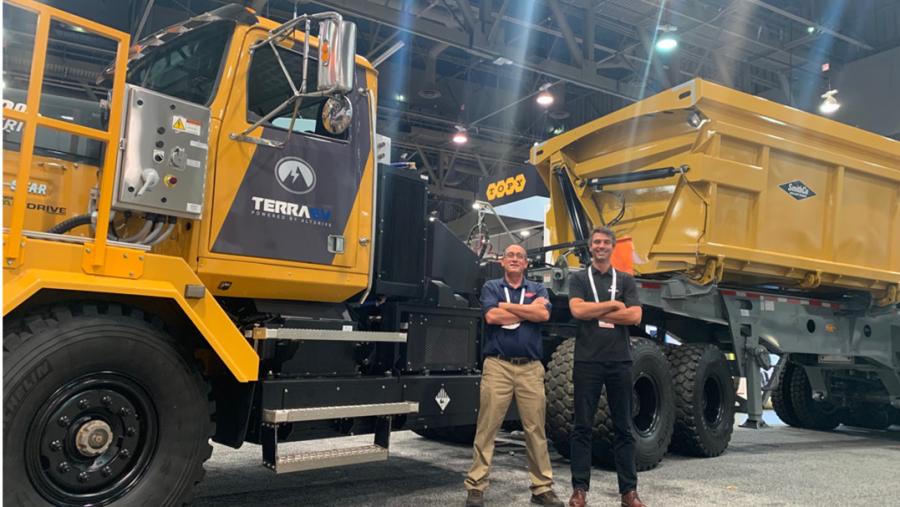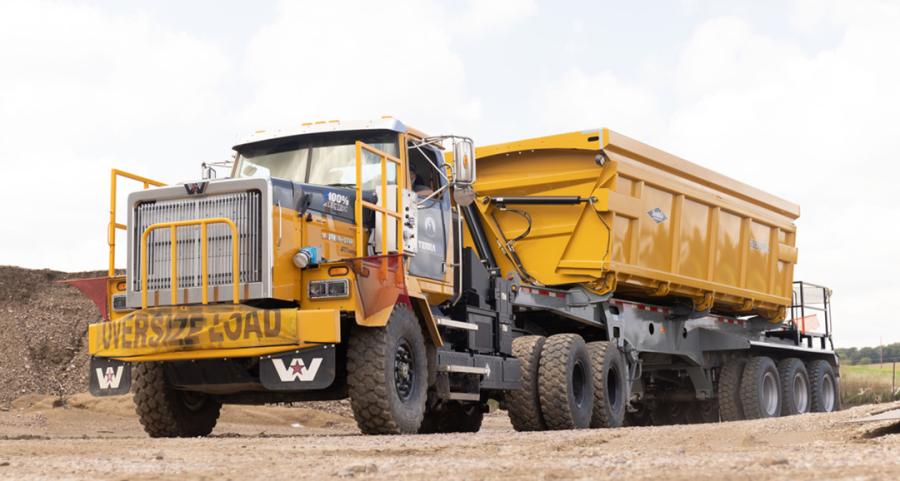SmithCo Side Dump Trailers and Terra EV have introduced the world’s first all-electric 80-metric-ton off-road haul unit.
SmithCo Side Dump Trailers, a leader of side dump trailer design and manufacturing, and Terra EV, a pioneer in all-electric vocational trucks, have introduced the world's first all-electric 80-metric-ton off-road haul unit.
Combining the Terra EV all-electric off-road tractor with a SmithCo off-road Mine Series Tipper trailer creates the perfect combination that makes all-electric mining feasible, according to the companies.
The new TS-80e haul unit was showcased at MINExpo 2021 in Las Vegas in September.
Creating New Solutions
When moving massive loads with electricity, the goal is to reduce the energy required to move them. Terra EV has combined itsBoss B466 and Master M466 haul tractors with SmithCo's 80-ton capacity Mine Series Tipper trailer to achieve this goal.
SmithCo has a history of producing long-haul off-road mine units with capacities of up to 100 metric tons, and even more when the trailers are in train.
"Tractor trailers are the most efficient form of transporting heavy loads," said Scott Lovell, SmithCo president and CEO. "There is a reason all of the products moved around the world are tractor trailer units."
A tractor trailer unit spreads the load out, reducing the rolling resistance. Rolling resistance is one of the major parasitic losses to overcome and has an enormous impact on energy consumption. Rolling resistance also generates a great deal of heat, which is detrimental to the tire life in conventional large mine haul trucks.
The faster you move these large trucks, the less life you have in your tires. Tires also are a significant cost in a mine operation, with some tires costing as much as $100,000 per tire.
"We have 150-ton mine trailer trains running haul roads that are more than 125 km with little or no degradation due to heat issues. These units also have much quicker return speeds, moving more material per shift and dramatically lowering fuel costs. This makes it the perfect solution for all-electric power use challenges, and the product is made here in North America," said Lovell.
Paradigm Shift
Moving to all-electric haul trucks will require mine owners to rethink how they do production. Blasting materials into smaller pieces and loading trailers with multiple smaller loaders can reduce the time it takes to load trucks, reducing the gap in loading time compared to a large haul truck. A few extra people may be required at the pit, but the savings will offset this on smaller equipment, according to the company.
Unloading multiple bins at the crusher also requires the units to pull straight through and dump their loads in predefined spots. Offloading this way can be a bit slower than conventional tippers, but this time is easily made up for in return speeds and safety.
Stopping in the same place to dump provides an opportunity for recharging using the fast chargers. If the unit must dump in other locations, it also is possible to use the same offload point as a refill station before heading back down.
"Continually changing your process while unloading allows for reduced recharging times at the offload station," said Lovell. "Adding a smaller charge every trip keeps the battery full and allows the truck to run continually during the day. While the truck heads down into the pit, the regenerative braking also recharges the batteries and further reduces the charge time needed at the offload station. Taking a step back and looking at the loading and unloading methods, you discover there are different ways you can go, and they can result in significant savings to the operation."
Smaller machines also are less expensive to maintain with more affordable parts and quicker maintenance times for the entire operation. Moving to an all-electric powertrain allows for a reduction in mechanical complexity, eliminating moving parts in the engine, and reducing that cost even further, the company said.
On-Board, Fast Charging
All-electric hauling poses a different challenge to the mining and quarry industry than the current combustion engine technology. The existing solutions of making trucks bigger and bigger and adding larger fuel tanks does not work with current all-electric systems. Electricity is costly in price and in weight penalty, and simply adding more batteries does not work.
"Charging battery systems must be done intelligently, there is a limit as to how much power a battery can accept, and a limit on how much power a charger can output. You can liken the charging of a battery to a fuel tank in the sense of charge power being the fill hose flow, and the tank being the battery. You can only send so much liquid through the pipe at any given time. You can increase the flow if you increase the pipe diameter, but only to some extent, and filling takes time. The larger the tank is, the longer it takes to fill," said Robert Rennie, president of MEDATech Engineering, owner of the ALTDrive technology which is the powertrain in the TERRA EV products.
"In order to work with this limitation, you need to use your power extremely efficiently if you want these systems to become a viable solution. Parking the unit for 90 minutes per load is not viable in a production operation. New solutions to this problem are being developed to reduce charging times. The new TS-80e is equipped with a fast-charging system developed by MEDATech Engineering and ABB and can be recharged as quickly as anything on the market today."
Realities of Adopting All-Electric
With the effect of global warming becoming a reality worldwide, the drive to achieve Zero Emissions for all industries is a primary focus for investors. Most if not all OEM's for on and off-highway are working towards greener solutions with more urgency than ever before. Federal and state-level governments also are incentivizing green technology to help with the high cost of development. Credits for carbon tax and grants for purchase can significantly impact an operation's decision to invest now for the future. Terra EV is currently working with a select group of partners to expand and vet the product line.
"The TS-80e is slated to go for operational trials to validate our power usage calculations. We are confident the equipment will do the job as planned, and we pride ourselves on our simulation tools that are validated against real world scenarios. We have multiple units in the field that we have proven our simulation results against, and we always take the opportunity to get accurate numbers in a real-life application under full load," said Rennie.
"Pricewise, the TS-80e is already very competitive with conventional haul trucks with similar capacities. This gap narrows even further as we develop larger units.
"We are working on the development of new TS models that can haul up to 200-ton payloads, and that is very exciting for the group. The more weight we haul with a tractor trailer configuration, the more competitive we are against today's large conventional haul units," said Lovell.
Optimizing With Autonomous Systems
The all-electric Terra EV unit also can operate autonomously. Autonomous haul technology adds a whole new world of efficiency to all-electric haul processes. New autonomous systems now available on the market can be easily installed on the Terra EV unit and have been successfully running on Western Star conventional diesel units for more than two years.
In addition to offsetting the staffing required at the loading and unloading locations, the autonomous systems have other benefits such as being able to continuously monitor the electrical power systems and react to changing needs of the electrical systems and haul route. With this continual feedback and adjustment loop, the battery energy is maximized and allows the truck to go farther with less energy loss.
Operators add a tremendous amount of variation to the operations. Using more power during the haul and sitting and waiting at the unload station is inefficient using diesel or electric methods. Autonomous systems know exactly where all the other units are and will pace the haul trip accordingly. The systems also can repeat the haul route precisely, allowing for exact placement at the charging station on each pass.
Automated systems also eliminate an operator's chances to pull away too soon or wait too long at the charging station. The culmination of these technological developments simultaneously makes all-electric hauling a reality today.
For more information visit sidedump.com, terra-ev.com and medatech.ca.
Today's top stories


















